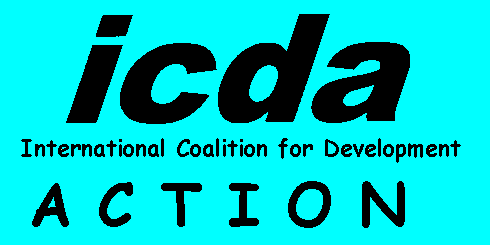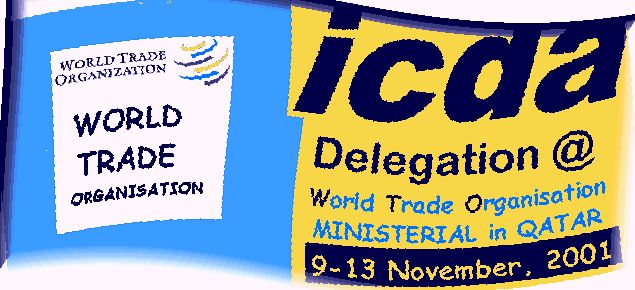
This site is best viewed with
| ICDA LATEST |
ICDA Latest News
Programme areas
ICDA History
| ICDA MEMBERS |
Current Members
| WTO IMPACT LIST |
Subscribe Here
What do you think?
| CENNT |
Latest News
IWGGT (in construction)
| PUBLICATIONS |
Latest ICDA Journal (in construction)
Latest ICDA Update (in construction)
| VACANCIES |
Internship
Book Keeper/Part time administrative Assistant
| HELP |
FAQ's
About Us
Contact Us

| BACKGROUND >> Towards a World Transnational Organisation? |
| By: Myriam vander Stichele |
Transnational Institute, 30 April 1998
The year 1998 marks 50 years of the global trading system under GATT and World Trade Organisation (WTO). Celebrations take place at the second bi-annual Ministerial Conference from 18th to 20th May 1998 in Geneva. At the same time, renegotiations are being prepared due to start in the year 1999 or 2000. The EU Ministers already expressed their support for a so-called 'Millennium Round' which might introduce new areas into the WTO, such as an agreement to liberalise investment.
Citizen groups and non-governmental organisations (NGOs) see little reason for celebration. The Ministerial Conference and preparations for the new negotiations are being conducted in the WTO's usual nontransparent way, without consultations with citizens. Their concerns that free trade and investment only benefit a few and contribute to environmental destruction, are not taken into account. However, the views of business, especially from transnational corporations (TNCs), are well reflected in the WTO decisions. Two-thirds of world trade is conducted by one or more TNC. This booklet explains how TNCs easily influence decision-makers at the highest level and succeed. It does not pretend to cover the full story but indicates how the TNC interests play a crucial role in negotiations while WTO decision-makers pretend that free trade is in the interest of all.
New negotiations should not start without new analysis and better insight about the role and practices of corporations in a globalising world. This booklet suggests some ways to redress the current bias towards business interests, a minimum in light of the coming 50 years.
PREPARING FOR THE NEXT 50 YEARS
As the World Trade Organisation conducts its second bi-annual Ministerial Conference from 18th to 20th May 1998 in Geneva, it also celebrates 50 years of the global trading system.
While it is the 132 member countries who are responsible for decision-making across the WTO's organisational bodies, it is the private sector who conducts the actual trade and who is increasingly influencing the policy positions of member countries. For the very large firms, the multinationals and trans-national corporations (TNCs), the WTO is a very important domain of trade jurisdiction and a crucial determinant of the extent to which they are able to operate unhindered. An analysis on the role of TNCs in the WTO is absent in the WTO's own trade policy review mechanism and annual reports of international trade.
In 1997, the WTO reported that world trade in goods reached $ 5.3 trillion, and trade in services an additional $ 1.3 trillion. The United Nations Conference on Trade and Development (UNCTAD) figures indicate that:
? more than two thirds of world trade involves at least one multinational, half of which occurs within the same multinational around the world (intra-firm exports);
? with an estimated $7 trillion in global sales in 1995 - the value of goods and services produced by some 280,000 affiliates of the world's 44,508 TNCs - international production outweighs exports as the dominant mode of servicing foreign markets;
? TNCs were responsible for the $ 350 bn in foreign direct investment in 1995.
These figures reflect the fact that corporations having a global outreach through their subsidiaries or corporate partnerships, are better positioned to take advantage of international trade than are smaller unaffiliated companies. TNCs are structured to form global trade strategies which position them to take most advantage.
The enormous interest that TNCs have in the WTO is expressed through their growing influence over decision-makers on all WTO matters, which surpasses that of citizens and non-profit non-government organisations. Thus, the aim of this booklet is to examine how TNCs influence WTO decision-making and effect policy outcomes. This issue is particularly important in the context of upcoming events in the WTO.
The Ministerial Conference in May 1998 is important in the lead up to renegotiating the agreement in agriculture which is scheduled for the end of 1999. Although the Conference avoids to take decisions, it will face the renegotiation of the WTO agreement on services and the review of the agreement on investment measures (TRIMs)as well as TRIPs scheduled for 2000. The scheduled review in 1999 of Art. 27.3 (b) of the agreement on trade related intellectual property rights (TRIPs), providing exception on patenting of life forms, is hardly on the agenda.
The decision to conduct a new 'round' of negotiations revising many trade sectors simultaneously may be raised and could lead to WTO involvement in new areas - such as a new agreement on investment and competition rules. This potential round of negotiation has been dubbed the 'Millennium Round' - a phrase coined by Sir Leon Brittan, the trade Commissioner of the European Union, and vociferous supporter of the idea.
In March 1998, European Union Ministers agreed that they wanted the 1998 Ministerial Conference to set in train [a] thorough and wide ranging groundwork which would cover all potential areas of future negotiation in order to be ready for the Millennium Round to begin in 2000. They intend all contracting parties to pledge their commitment to the negotiations. A final decision is expected to be taken at the WTO Ministerial Conference in 1999. The EU Ministers intend to send a strong message to public opinion explaining the advantages and benefits of further liberalising trade. But it is important to ask to what extent benefits of trade liberalisation would be skewed in favour of TNCs, the main private actors in trade, and disadvantage the wider, national and local economies and communities
For more information on this article, please visit the site here: http://www.corpwatch.org/trac/globalization/treaties/trade7.html
Please click here to go back to WTOMC Page
Copyright ©E.K.BENSAH II PRODUCTIONS. 1998-2001